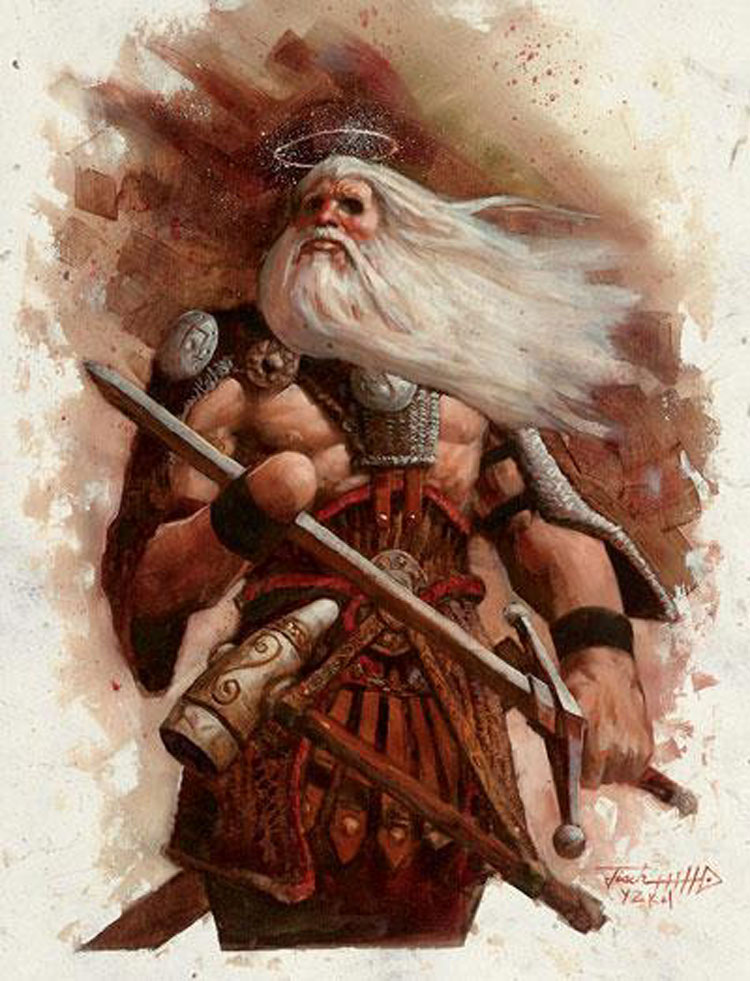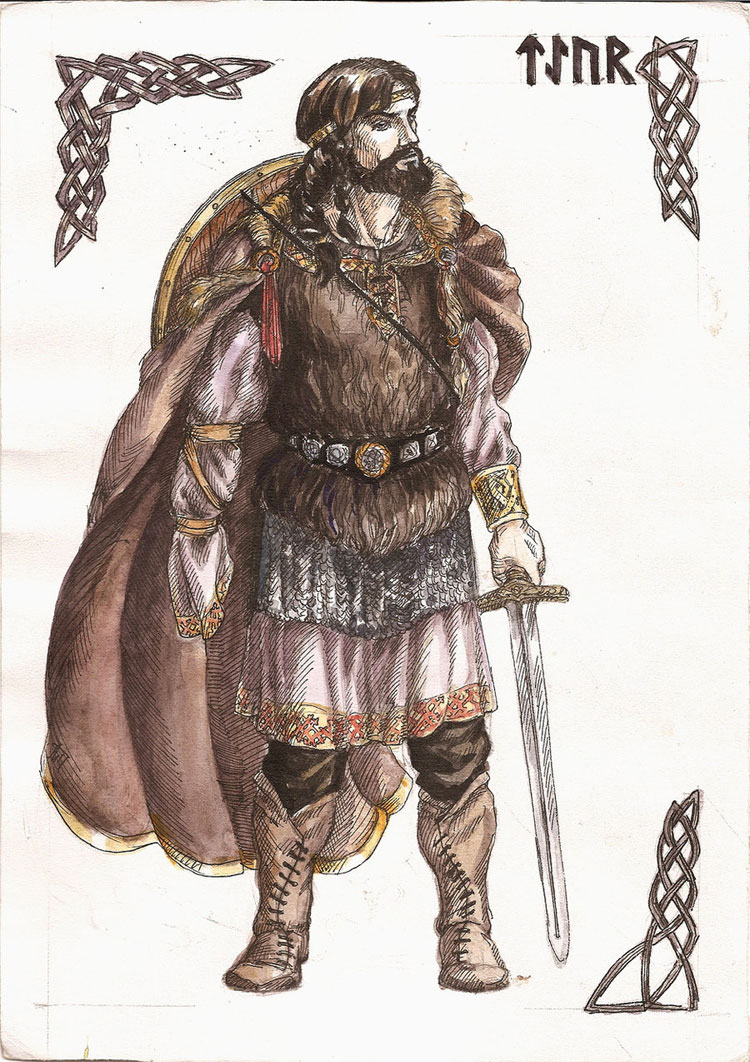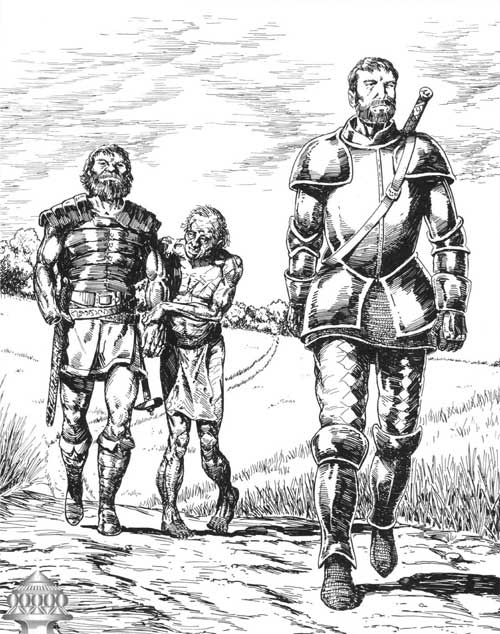Tyr
Before every criminal trial in civilized lands, good-hearted magistrates whisper prayers to Tyr (teer) the Even-Handed, asking that he guide their judgments with temperance and resolve. A utopian interloper deity who long ago came to Abios from a foreign cosmos, Tyr sees himself as a father figure working to craft a perfect society among the people of Abios, whom he views as his wayward children. The pain of knowing that his mortal charges cannot hope to initiate and protect a flawless, completely just orderly existence tinges Tyr’s philosophy with an undercurrent of resigned sadness.
Religious iconography depicts Tyr as an aging one-handed warrior, often with a bloody bandage covering his wounded eyes. The so-called Maimed God lost his right hand in battle with the ravenous entity known as Kezef the Chaos Hound. Worshipers have allegorized Tyr’s wounds as emblematic of the blindness of justice and the price the truly just must endure on the path of righteousness and stern defense of the law. Particularly radical Tyrran sects advocate self-mutilation among their adherents, a practice condemned by the large majority of the faithful, who nonetheless ritualistically don gauze eye coverings and an off-colored glove on their right hands to honor the Blind Overlord.
Clergy and Temples
Commoners view Tyr and his clerics as stern arbiters of justice, often missing the paternal philosophical nuances of Tyrran doctrine for its more obvious black-and-white teachings on the nature of morality. They tend to view Tyr as something of a divine constant -- they know that Tyr expects fairness, good judgment, and kindness toward the innocent from his followers, and hence afford Tyr’s clerics a great deal of trust.
Clerics of Tyr pray for spells at dawn. In addition to numerous minor holidays, Tyr’s priesthood follows a strict regimen of monthly high rituals. On the first of each month, Tyrrans celebrate Seeing Justice, at which specially chanted prayers elicit the appearance of a white-hot war hammer that glows with heat and light. The thirteenth day brings celebration of the Maiming, at which the congregation sings loud, booming hymns as an illusionary gauntleted hand surrounded by a nimbus of burning blood appears above them. A similar ritual called The Binding, which takes place on the twenty-second day of each month, involves an image of burning, crying eyes.
The Tyrran faith appeals to those who seek to bring order to the disorderly, to punish the wicked, and to ensure that civilization prospers through a careful, fair system of justice. Theirs is a doctrine of justice through benevolent force and armed vigilance, a philosophy that makes the faith attractive to paladins and lawful fighters. Most adherents do not fight in the field, however, instead seeing to important battles in the courts as bureaucrats, judges, bailiffs, and merchants. Tyrrans tend to view all affairs in clear-cut moral terms, preferring to see the world ordered by just laws that provide the greatest benefit to all. They tend toward intolerance, sometimes violently so, and seldom tolerate mockery, parody, or the questioning of their faith.
Clerics of Tyr bring law to lawless lands, often serving as judge, jury, and executioner. Without a civilized legal code with which to guide their judgments, they often default to a doctrine roughly equivalent to “an eye for an eye, a tooth for a tooth.” However, Tyrrans prefer to err on the side of mercy, and frequently commute otherwise harsh sentences for cases in which the offender was ignorant of any wrongdoing. Such criminals usually find their names recorded in the cleric’s Book of Lawgiving, which is then shared with the nearest temples to prevent that perpetrator repeating the offense and getting off lightly.
In civilized lands, Tyrrans (inevitably called “tyrants” by their legion detractors) tend to become legal experts, advising rulers, judges, or powerful merchants on the intricacies of the law and arguing cases before magistrates. They view the latter as charity, donating their (sometimes lavish) “speaking fees” to the church.
Regardless of their setting, Tyrrans never enforce a law that can be shown to be unjust -- defined by the church as out of compliance with the principles and definitions adhered to by other laws in the body of legal doctrine of which it is part. This sometimes forces Tyrrans to support very unfair laws that are, nonetheless, just. In many such cases, Tyrrans attempt to change the laws by working within the system. Those who break even unfair laws as a form of defiance or political dissent are nonetheless guilty, in their view, and deserve to be punished to the fullest extent the law allows.
In some cases, Tyrrans act as agents of vengeance for those who have been wronged and who cannot afford or are no longer around to defend themselves. In such cases, when the law is so broken down as to become meaningless, clerics of Tyr act openly to defy evil or corrupt forces, martyring themselves if such becomes necessary.
Dogma
Reveal the truth, punish the guilty, right the wrong, and always be true and just in your actions. Uphold the law wherever you go and punish those who do wrong under the law. Keep a record of your own rulings, deeds, and decisions, for through this your errors can be corrected, your grasp on the laws of all lands will flourish, and your ability to identify lawbreakers will expand. Be vigilant in your observations and anticipations so you may detect those who plan injustices before their actions threaten law and order. Deliver vengeance to the guilty for those who cannot do it themselves.
History and Relationships
Tyr’s actions and sacrifices during his arrival to the Abian pantheon attracted the attention of the previously obscure Ilmater, who joined forces with Tyr. Years later, Torm joined up as the Just God’s war leader. Together with Ilmater, the deities became known as The Triad, by which they are still referred to this day.
Tyr has expanded his dominance over the whole of Abios -- few are those who do not know his name or the enthusiastic ideals he represents. His is a civilizing voice, urging the construction of moral and legal codes and the administration of fair justice for sentient creatures in every land. In this regard he is both progressive and regressive, representing a force for cultural development in lands with corrupt or no legal systems and representing a stern defense of the status quo in nations with well-established codes of law.
Divine Classification
Greater Deity
Honorary & Occupational Titles
- The Even-Handed
- The Maimed God
- The Just God
Children
Gender
Male






